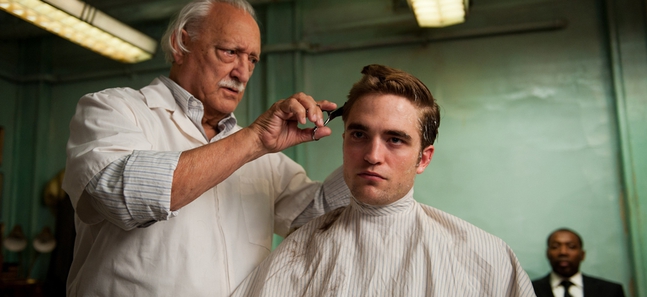Cosmopolis
David Cronenberg gets psychosexual in the world of the super-rich

© 2012-COSMOPOLIS PRODUCTION INC. / ALFAMA FILMS PRODUCTION / FRANCE 2 CINEMA
Posted: Wed Apr 03 2013
Director: David Cronenberg
Starring: Robert Pattinson, Samantha Morton , Paul Giamatti
Time Out rating: 
David Cronenberg’s Cosmopolis is a weird, heady and entrancing portrait of individual alienation in a super-rich, corporate world where money, sex, love, happiness and death are rapidly losing all meaning. It’s based on a 2003 novel by Don DeLillo, and while it offers some superficial relevance to the current financial crisis, and trades in some of its imagery and events (markets crashing, protests), this is not in any way a realist work. It takes Cronenberg back to territory he hasn’t explored since eXistenZ and Crash – this is also his first script since those films. It’s a psychosexual, more interior companion piece to films like Inside Job and Margin Call.
Cosmopolis gives us a young man riding through Manhattan in a limo on a day that feels more and more like his own self-made apocalypse. He’s a super-rich New Yorker, Eric Packer (Robert Pattinson), a 28-year-old billionaire captain of the money markets and tech industries. He insists on travelling across town for a haircut, even though his driver warns him that a presidential visit and a rap star’s funeral are causing traffic gridlock. Packer’s world is confined to this luxury vehicle. It’s full of screens and gadgets and it’s here that he’s joined first by a 22-year-old whizz kid and then two women, one played by Juliette Binoche, the other by Samantha Morton. Outside, Packer encounters a protester (Mathieu Amalric) who is determined to shove a cream pie in his face, his soon-to-be-ex wife (Sarah Gadon) and a man with a serious vendetta against him (Paul Giamatti).
Cosmopolis is an odyssey defined by a series of one-on-one encounters. There are prostate examinations, stripped bodies, sex, conversations about Rothko and souped-up chats on subjects such as the philosophies of financial security systems and how time is a corporate asset. Much of the talk makes no obvious sense: Cosmopolis has the air of an experimental theatre piece and trades in heightened, eroticised language. You could say it tries to turn the mind of Packer inside-out: to make the psychological real. That’s tougher on film, surely, than in print, and Cosmopolis is at its best when it’s otherworldly and aching with artifice. It’s at its worst when it becomes weighed down by an excessive, wearying wordiness, or when it steps out of the limo – the film’s self-imposed arena of surreality – and into a place more like the real world. Cosmopolis threatens to soar and to be important, but it only offers flashes of lucidity; the limo is a mesmerising bubble that is quickly burst when the film leaves it.
That said, there’s a consistent air of charged, end-of-days menace running through the film, which Cronenberg handles with an unbroken sense of precision and confidence. He’s well served, too, by a leering, disintegrating Pattinson, giving a commanding, sympathetic portrait of a man being consumed by his own vanity and power.
Cosmopolis opens at select cinemas nationwide on April 13
Tweets
- About Us |
- Work for Time Out |
- Send us info |
- Advertising |
- Mobile edition |
- Terms & Conditions |
- Privacy policy |
- Contact Us
Copyright © 2014 Time Out Tokyo














Add your comment